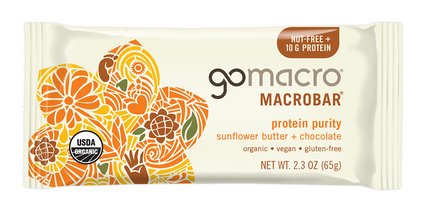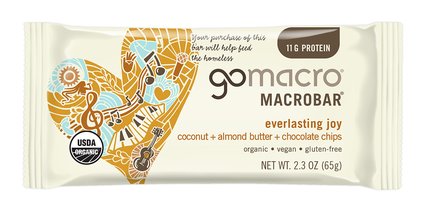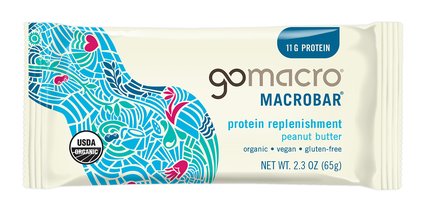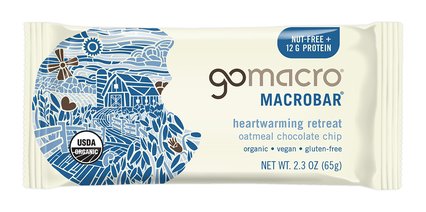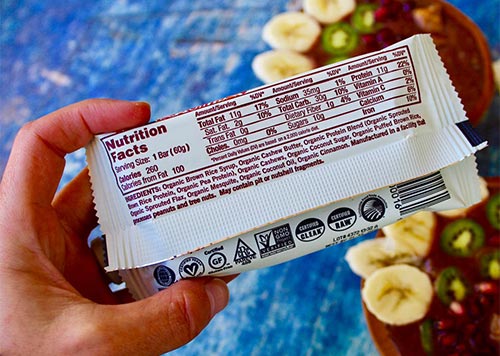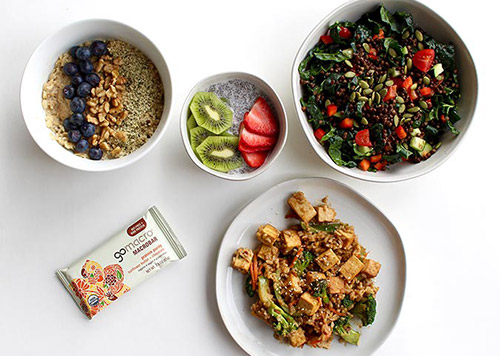Is Organic Food Better for You?
In the early 2000s, organic foods were typically only found in natural food stores and special “health food” sections. Now, you can find a wide selection of organic items in nearly every grocery store in the country – and many stores are even dedicated solely to natural and organic foods. As we’ve learned more about the connections between food, health, and the environment, many of us have started demanding more transparency when it comes to how our food is grown and processed.
At GoMacro®, we believe that natural, less processed foods that are closer to the earth are healthier for the body and soul – but does data indicate that organic food is truly better for you? Here are some considerations to help you make the best choice for your needs and values...

What Makes Food Organic?
Organic is a system of farming and processing agricultural products that aims to benefit people, the planet, and the food system as a whole. While most organic farms share many similarities, like working to improve soil and water quality, reduce pollution and synthetic chemical use, and work in harmony with nature, the United States Department of Agriculture (USDA) has very specific guidelines when it comes to what food can legally be labeled “organic.”
USDA Organic crop production standards prohibit most synthetic fertilizers, pesticides, and herbicides. They also prohibit genetic engineering, ionizing radiation, and sewage sludge fertilizers. Instead, organic crop nutrients are managed through natural methods like crop rotation, cover crops, and animal and crop waste materials, along with very specific synthetics allowed by the USDA. Pests and weeds are managed with physical and biological controls, along with approved substances (like non-synthetic mineral inputs) when needed.
The USDA uses several terms to describe organic foods, so understanding these labels can help you make the best decision for your needs. “100% organic” is used for foods that contain only 100% certified organic ingredients (or one-ingredient foods, such as an organic apple). “Organic” may be used when at least 95% of the ingredients are certified organic, and the ingredients that aren’t organic must be from a USDA-approved list. Both of these categories can carry the green USDA Organic seal -- like the ones you see on all MacroBars®!
“Made with organic” means a product contains at least 70% certified organic ingredients, while “organic ingredients” can be used on the label if a product has some organic ingredients but less than 70% are certified organic. Neither of these can use the USDA Organic seal.
Although the terms are often conflated, all of these labels are different than “natural,” which usually means that the product has no artificial colors, flavors, or preservatives – but “natural” doesn't have anything to do with the methods or materials used to grow the ingredients. In fact, the regulation and guidance around the use of the word “natural” on food labels is murky at best.
Are Organic Foods Healthier than Non-Organic?
The conversation around what constitutes “healthier” is nuanced, so it’s difficult to make a blanket statement about whether all organic foods are healthier than non-organic foods. When you compare apples to apples – or rather, organic apples to conventionally grown apples – there may be significant health benefits to choosing organic. Clinical trials directly related to organic food consumption are still limited. However, longitudinal studies indicated that increased organic intake was associated with many positive health outcomes. These included reduced incidence of infertility, birth defects, allergic sensitization, pre-eclampsia, metabolic syndrome, high BMI, and non-Hodgkins lymphoma.
Even so, an organic label on its own is not a guarantee of health or nutritional value. Organic potato chips still contain potatoes, oil, and salt just like any other potato chip; those ingredients were simply grown without the use of synthetic inputs.
If you’re new to shopping organic, your local farmer’s market or CSA program is a great place to start. Small, local producers not only have a lower environmental footprint, but they can also give you information about their growing practices. If you find a complete switch to organic produce cost-prohibitive, consider first starting by switching to organic versions of the “Dirty Dozen.” The conventionally grown fruits and vegetables on this list tested positive for at least 47 different pesticides and potentially harmful chemicals. On the other hand, the “Clean 15” displayed little to no traces of pesticides when conventionally grown and are generally considered safer to consume in non-organic form.
Is Organic Food Actually Better for You?
As we’ve discussed, organic foods may have potential health advantages over their non-organic counterparts. Even so, it’s important to remember that just because a food is labeled “organic,” that doesn’t automatically make it healthier or suitable for every person.
For example, organic cane sugar is still cane sugar, and organic canola oil is still canola oil. Both foods will likely create a nearly identical physiological response in the body. That’s why it’s important to focus on whole, plant-based foods first and foremost, and then seek out organic versions whenever possible.
Benefits of Organic Food
While scientific consensus on the specific health benefits of organically produced food is still developing, there are many potential advantages to eating organic foods, including:
- Lower pesticide residue. Organic food has significantly lower pesticide residues compared to conventionally grown food. This is notable, as synthetic pesticides are potentially toxic to humans and can have adverse health effects including cancer, effects on reproduction, behavioral development, immune, and nervous systems.
- Minimal processing. Organic foods may contain processed ingredients (after all, even rolled oats are technically “processed”). However, eating organic allows you to automatically avoid some of the most highly processed and potentially harmful ingredients like synthetic food dyes, hydrogenated oils, GMOs, and artificial flavors.
- Nutrient levels. Studies have shown moderate increases in certain nutrients in organic vs conventionally grown food, especially certain antioxidants called flavenoids. This effect may be due to improved soil quality and biodiversity on organic farms.
- Lower in heavy metals. Cadmium is a heavy metal that is toxic to the kidneys and carcinogenic. Studies have found that organically grown grains have significantly lower levels of cadmium, which is related to the ban on synthetic fertilizers in organic farming.
- Sustainable farming practices. Just as some people choose to eat plant-based to lower their carbon footprint, eating organic can be another way to align your diet with your values around sustainability as organic farming reduces the amount of synthetic herbicides and pesticides introduced into the environment.
In summary, if it’s accessible to you, there are very few downsides and many potential health benefits to choosing organic foods. While more clinical research is needed to confirm the specific health benefits of organic foods, longitudinal studies have identified many potential advantages. Meanwhile, the only potential drawbacks to choosing organic are price and availability.
If you’re in need of a delicious organic snack you can feel good about, all GoMacro products are Certified Organic and made with carefully sourced ingredients you can feel confident enjoying.
